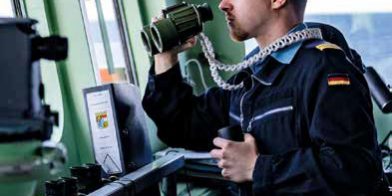by Dr Moritz Brake, independent expert and consultant on maritime security and strategy, Cologne
When on 26 September 2022 the two “North Stream” pipelines exploded, there was a striking lack of awareness of the general situation at sea or under water in the vicinity of the incident. European coastal countries on the North and Baltic Seas knew less about the comings and goings in their maritime backyard than they did about those in the Mediterranean – a partial blindness, which was of little consolation at least to those of the European countries that are also members of NATO. After all, ever since the establishment of an expansive and continuing NATO-led maritime surveillance effort in the Mediterranean in the wake of the international response to the 9/11 terrorist attacks, European countries substantially benefitted from the increase in maritime domain awareness that the “Operation Active Endeavour” (OAE) has entailed towards their south.
Benefiting from NATO operations
Judging by what is at stake at sea, the available resources of the European Union (EU) Member States individually are insufficient to address the scope and quality of the maritime security threat posed by Russian hostility. Over 80% of the EU’s energy supply is imported by sea, while a growing share of the domestic energy production is maritime in nature. It comes from offshore wind parks or oil and gas rigs. Also, fishing is more than just a business – it feeds people and provides livelihoods. At the same time, the EU economy depends on maritime commerce and data transmitted by undersea cables.
With its comprehensive maritime security approach in the Mediterranean, NATO has become the chief provider of maritime domain awareness and integrated intervention capabilities for Europe’s southern coast. Indeed, ever since NATO set up its much broader maritime security mission “Sea Guardian” to supersede and continue the work of OAE in the Mediterranean in 2016, allied military surveillance and intervention capabilities not only provide a comprehensive and multinational integrated resource of maritime awareness, NATO warships in the area can also speedily respond to any criminal, hybrid or military threat to European maritime security.
For a Northern Flank maritime mission
When it comes to the North and Baltic Seas, the so-called Northern Flank of NATO and the EU, no comparable, comprehensive maritime security mission exists – even one year after the attacks on the North Stream pipelines exposed blatant gaps in surveillance and intervention capabilities of the Member States. The role of such a mission is – as OAE and Sea Guardian demonstrate – more than just symbolic.
A Northern Sea Guardian-type EU and/or NATO maritime security mission could:
- pool and coordinate scarce resources across states, working with established shared procedures;
- facilitate the integration of assets from other NATO and EU Member States;
- unify command structures, clearly delegate authority and
reliably implement political rules of engagement; - exercise adapted procedures to make them commonly
accepted practice when reaction times need to be short; - assist in capacity building and training efforts to rapidly expand capabilities;
- provide integrated maritime surveillance;
- establish a long-term database of maritime activity to quickly discern anomalies;
- provide a single point of contact for interconnection with civilian and military member state agencies for information-sharing and security assistance.
Germany – a key NATO coastal state
As an added benefit, concerning Germany, the most powerful EU Member State and key NATO coastal state in the Baltic Sea, a NATO or EU operation would solve the lingering debate about its navy’s authority to intervene against non-military threats. The Federal Republic’s post-war constitution calls for separating civilian and military security. This creates – at least from the point of view of some political and legal commentators – the paradox that a Russian hybrid, quasi- or para-military threat to maritime security requires a civilian German law-enforcement response. The police, equipped to face criminals, is likely to lack the capabilities to deal with hybrid threats, while the navy – which has the capabilities – lacks the legal authority. To avoid having to rely on courageous last-minute political action to overcome constitutional grey zones, a multi-national mandate could provide a feasible alternative. As proven by over thirty years of deployments – including as a maritime security provider – the Bundeswehr can be employed against non-military threats as part of NATO, EU and UN missions.
Guaranteeing Europe’s liberty
Drawing on its strengths and past experience, the EU would greatly benefit from a coordinated maritime presence, a formal EU or NATO operation to provide comprehensive maritime security in the North and Baltic Seas. This would facilitate the cooperation of all Member States, their comprehensive effort including civilian and military capabilities. Furthermore, through such a mission, integration and close coordination with NATO’s superior capabilities and information sharing environment could draw on decades of experience.
Europe must protect its maritime security. It needs to leverage the full potential of its civilian, military and allied capabilities in order to maintain its competitive edge and preserve the quality of life of its citizens. Maritime security is a key element of EU security, a cornerstone of its power in a world of competing great powers, and therefore ultimately indispensable for Europe’s liberty.







